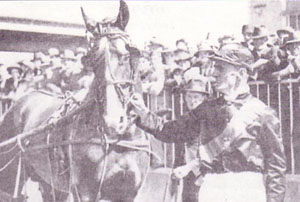| RACING HISTORY |
YEAR: 1939
FEATURE RACE COMMENT
 |
| Lucky Jack & Roy Berry |
The ever-ready excuse book was well in evidence after the New Zealand Cup last week and it would seem that at least four horses should have ended up in Lucky Jack's position as the 1939 winner. Nevertheless, that horse achieved the distinction of winning his second Cup, and he had to overcome difficulties and prove himself a real horse to take that honour on the day.
Lucky Jack gave a really fine performance, running up handy to the leaders with half a mile to go and fighting on gamely in the run home. This was easily his best effort to date, and one which stamped him as being close to the champion that owner Bill Lowe claims he is.
To "Truth" Lucky Jack has always appeared to fall just short of championship class. Not that he is lacking in speed or stamina - he has those in abundance - but because his off days have been sufficiently numerous to suggest that he has to be caught in the humour to display his talents in full.
This trait was illustrated when he came out to contest the Free-For-All on Friday, his only other start at the meeting. On this occasion he failed to go off, and he only beat two horses home. He does not give the consistently solid and generous displays of "Truth's" idea of a true champion, but when he does set himself out to do his work in his best style, he impresses as having few superiors.
There is, by the way, an interesting sidelight to Lucky Jack's victory. Shortly after he won his first Cup there was a great outcry against the handicapping system because he was placed on a tight mark. It was claimed that as a racing proposition he was ruined, although only a five-year-old and his stake winnings stood close to the £2000 mark. Since then he has gone on to increase that total to almost £3000 and there is every reason to suppose that he will add considerably to that amount. The figures are an effective reply to those who attacked the handicapping system from that angle.
There is no more popular sportsman than owner Lowe, and his horse's victory was well received. He did everything asked of him and could not have won if he had not fought on gamely for the honour. Cantata and Blair Athol filled the second and third placings respectively, and both were unlucky. The former did not get the best of the running in the final quarter, and Blair Athol was giving most of his field a start with half a mile to go. There were only necks between the first three horses at the post and luck in the running made all the difference.
How Colonel Grattan would have fared but for losing his driver a little over four furlongs from home is a matter of conjecture. Whether or not he would have won can provide material for an unsatisfactory argument, but the manner in which he ran on after his accident suggested that he would at least have been in the money.
Plutus was a fair fourth, after being in the fight throughout, but Parisienne, Gallant Knight and Fine Art, the next to finish, were well out of sight of the judge. There was then a big gap to Lawn Derby, which broke soon after the start, Marsceres, Rocks Ahead and King's Play.
In "Truth's" opinion the really unlucky horse was Fine Art. He was never off the bit at any stage of the running, and he was handy turning for home, but the tiring Gallant King so far forgot his manners as to carry McTigue's gelding back through the field in the final quarter. Boxed in on the fence behind Gallant Knight, Fine Art was simply carried out the back door, and at no stage of the run home did he get an opportunity to show his worth, being a helpless victim of the backwash.
On Thursday he gave a taste of his ability by winning the Ollivier Handicap without any trouble, and it is the "Truth's" opinion that he would have treated the New Zealand Cup field in a similar manner with circumstances more in his favour.
-o0o-
TRAGEDY MARS CUP
One of the sport's keenest supporters, and one of thne most prominent and popular men connected with light-harness racing, Eugene McDermott died, with tragic suddenness, during the running of the New Zealand Cup, in which he drove Colonel Grattan.
With a little over half a mile to go, and while leading the field, Mac was seen to collapse and fall from the sulky, and he expired before the ambulance could get him back to the birdcage.
Eugene made his entry into the sport over 25 years ago, quickly coming to the fore as an amateur rider and driver, and he later took out a professional licence as a trainer and driver.
During his connection with the game he handled many good horses, and made a name for himself as a clever reinsman and a sportsman of the highest calibre. His good qualities earned for him the respect and admiration of all, and the sport is considerably poorer for his passing.
He will be missed, but remembered for many years to come.
Credit: NZ TRUTH 13 Nov 1939